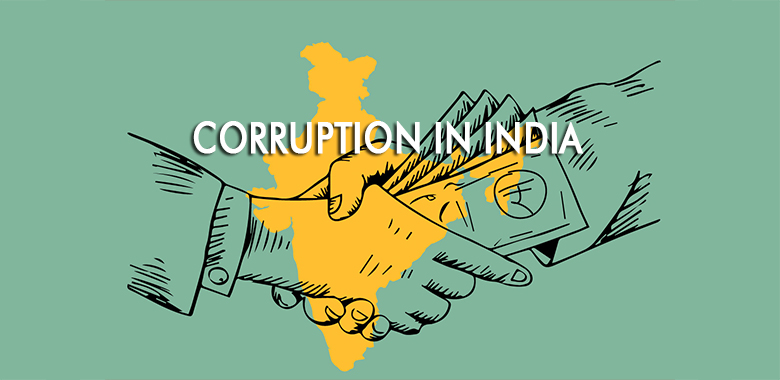Five years ago, we gave Narendra Modi the chance to realize his big promise: clean up the corruption in India. Today, Modi’s promise remains a promise. Corruption is still thriving in India, in all the usual places.
Corruption in our country is also evidenced by a string of reports from Transparency International. Like the one published early this week, ranking India 78 in corruption out of 175 countries.
Prime Minister Modi and his Bharatiya Janata Party came to office with a promise to free India from the vice of corruption. Our country has also been ranked among the “worst offenders” in terms of graft and press freedom in the Asia Pacific region.
“Philippines, India and the Maldives are among the worst regional offenders in this respect,” states the 2017 report. “These countries score high for corruption and have fewer press freedoms and higher numbers of journalist deaths. In the last six years, 15 journalists working on corruption stories in these countries were murdered, as reported by the Committee to Protect Journalists (CPJ) .”
Persistent corruption is usually a big impediment to spreading the benefits of economic growth from a narrow elite to the masses. And that could explain a big decline in the percentage of Indians who rate their lives positively enough to score it as “thriving” since Modi’s Party assumed office, as discussed in a previous piece here.
India’s situation is neither new nor unique in the emerging market world. And it has been nicely rationalized by Daron Acemoglu and James A. Robinson in Why Nations Fail: The Origins Of Power, Prosperity And Poverty. In most global emerging markets, the “state” – ie the political institutions that set up the rules of the economic game — represents a few economic elites rather than the masses, according to the authors of the book.
That’s a breeding ground for the rise of crony capitalism and corruption. Populist governments of all kinds and sorts come to the office with the promise to change this situation. But all too often it is the existing situation they embrace once in office.
Corruption has several negative effects, it is, therefore, vital to have a corruption-free environment. The reason why we should become corruption-free is discussed below:
A large number of in our country, especially the people living in rural places suffer innumerable hardships and they are denied basic living amenities such as pure drinking water, drainage facilities, and education. Although the Indian Public services have succumbed under the strain of the inefficient and corrupt bureaucratic setup. According to studies over 40% of the funds allotted by the government for the development of the rural places do not reach the people. A complete end to corruption is the only way we can lead a better life.
We have been facing the problems of unemployment and underemployment for long. The problems of unemployment are more prevalent in urban areas. While several people are finding it difficult to find job opportunities in the field of their choice, some others become victims of unemployment due to the corrupt practices of the employers. This includes recruiting the candidates by taking bribes or donations. Also, in several companies, especially public sectors, recruitment is based on the caste of the person rather than based on merit. Owing to such corrupt a lot of deserving youngsters are denied work opportunities.
Owing to the corruption, one of the most adverse problems faced by India’s economy is the alarming growth of regional differences among Indian states, the drastic decline of per capita income, disparity in socio-economic development, poverty and lack of good infrastructure facilities. The economic disparity is clearly reflected by the fact that nearly 40 to 50 percent of people living in Orissa and other states live below the poverty line. While the rich are growing richer, the poor are becoming increasingly poor.
Corruption has a severe negative impact on the economy of the country. Besides, it maligns the image of the nation in the international world. The best example is the recent Commonwealth Games scam. The event is a global phenomenon and owing to the presence of International ambassadors and media, the event bought a disgrace to India. Only a corruption-free state can prevent the nation from disgrace.
The corruption is so deeply rooted in India that it has not spared even the justice system of the country. Corrupt leaders and bureaucrats are spared from strict punishment for all their criminal activities. The criminals easily get away by paying large sums of bribes to the judicial authorities. The people too are tolerant of such activities, they fear raising their voice against such anti-social elements. A corruption Free State will surely lead to more development and justice will prevail.
Due to the large scale corruption prevailing in almost all the sectors, among all the developing countries India has the largest budget deficits. Reduction in corruption will increase the scope for investment in public services like education and health facilities.
Although our country has huge amounts of foreign currency reserve, the current account deficit has deteriorated significantly in the past few years due to corruption. The anti-corruption measure could prevent the balance of payment deterioration
Tax evasions by politicians, a business person is one of the most common forms of corruption in India. The tax evasions spell a large number of losses for the Indian exchequer. Strict financial laws will ensure that the tax is paid promptly and the amount can be used for better Infrastructure development.
A large scale awakening by masses for an anti-corruption state will lead to a safer and healthy community.
Without corruption, our country will experience tremendous progress in diverse fields and be a force to reckon with in the International arena.
